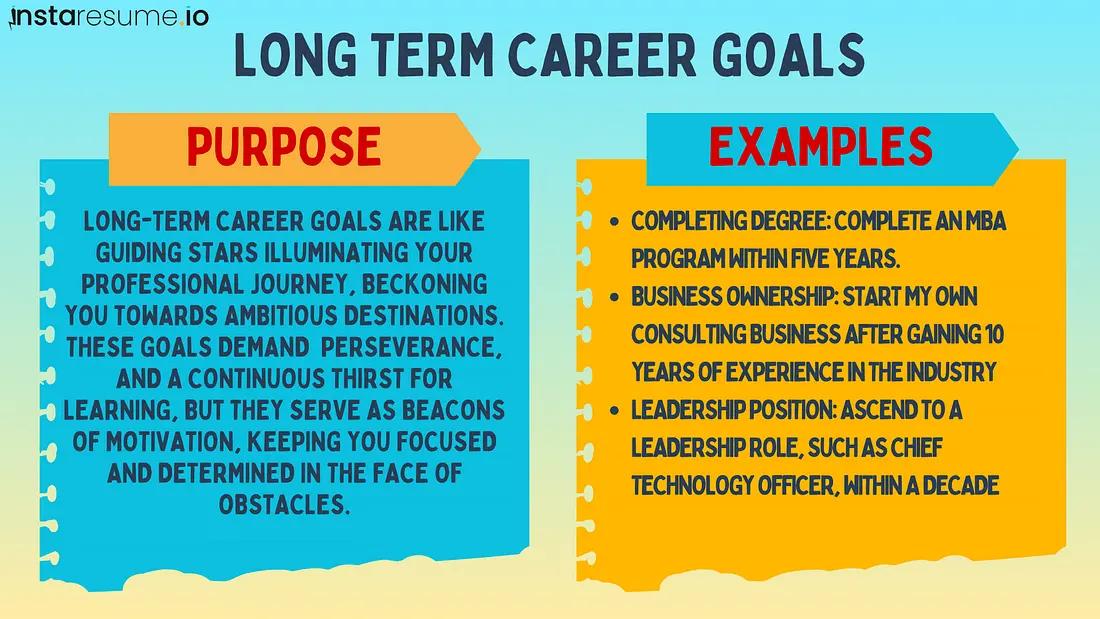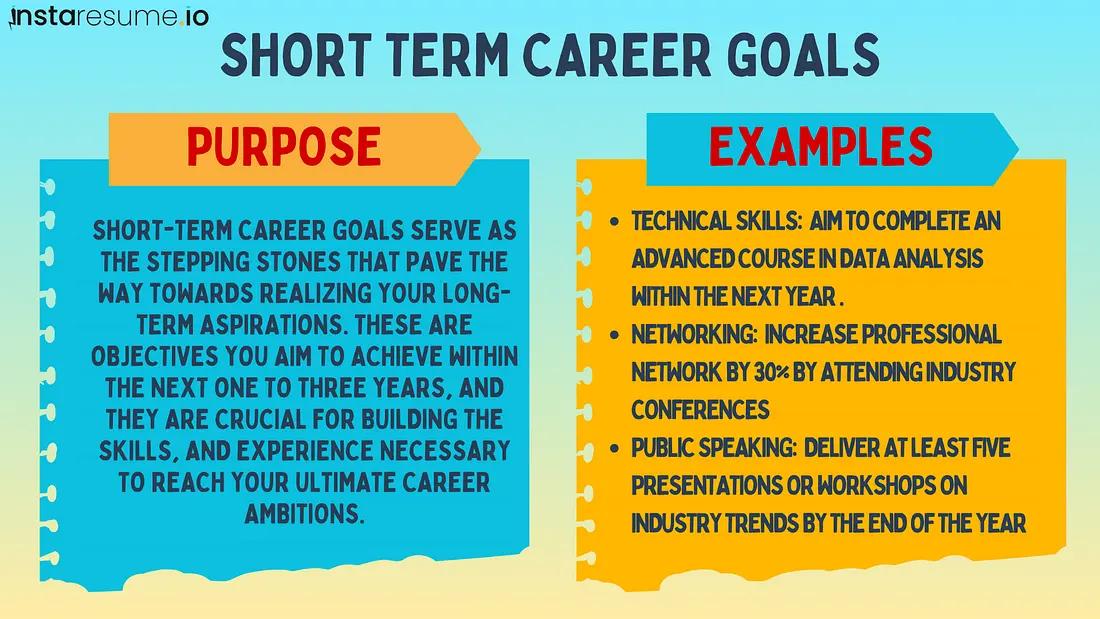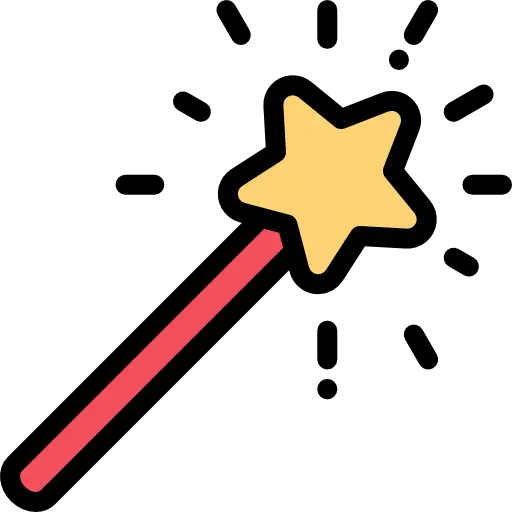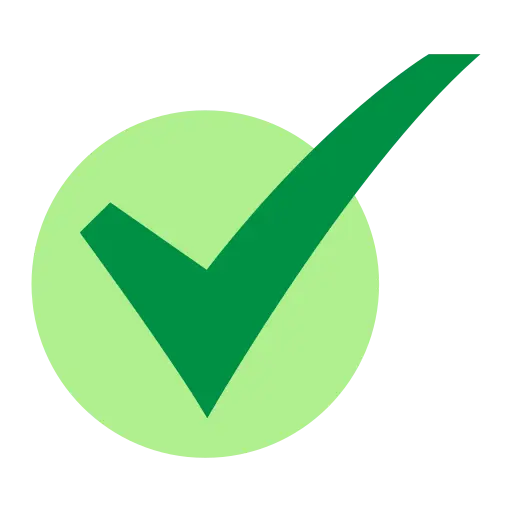Exploring Roadmap to success : What are your career goals?
Trust Score: 4.7
361 reviews

Table of Contents
Introduction
The question “What are your career goals?” is often compared to the childhood question “What career path do you see for yourself in the future?”. However, while we may have had a clear answer at the age of 6, defining our career aspirations and dreams as adults can be more challenging.
It's important to approach this question with the same level of certainty and confidence as we did when we were young. This can be difficult if we are unsure of our goals or how to articulate them effectively.
That's why this guide has been created — to help you define your career objectives and prepare for answering this important interview question with confidence.
So let's dive in! We'll explore different strategies for setting and communicating your career goals, as well as providing tips for answering this question during an interview.
By the end, you'll have a better understanding of your goals and be equipped to tackle that formidable interview question with ease. Let's get started!
Defining career goals
When contemplating your career goals, consider them as a compass that guides your professional journey rather than a rigid checklist. It's about setting a direction that aligns with your values, skills, and passions.
Whether your aspirations or dreams include climbing the corporate ladder to a senior executive position, pivoting to a completely different industry, or starting your own venture, it's crucial to define what success means to you personally.
Your goals should inspire growth, challenge your abilities, and ultimately lead to a fulfilling career path. These objectives might evolve over time as you gain new experiences and insights, allowing your professional ambitions to adapt and flourish in an ever-changing job landscape.
When thinking about your career goals, it's important to view them as a compass that guides your professional journey rather than a rigid checklist.
Defining your career objectives involves understanding what motivates you and brings you fulfillment in your work. These goals should align with your values, skills, and passions, and inspire growth and challenge in order to create a fulfilling career path.
Success should be defined personally, whether that means climbing the corporate ladder, switching industries, or starting your own business. It's important to keep in mind that these goals may change over time as you gain new experiences and growth in an ever-changing job market.
Types of Career Goals
Short term career goals:
Short-term goals generally focus on immediate needs and steps that lead to advancement, such as acquiring new skills, completing specific projects, or securing promotions within your current job framework over the next year or two.
Long term career goals:
On the other hand, long-term goals encompass aspirations that require more time and strategic planning to achieve, often extending over five to ten years or more. These could include reaching a particular leadership position, transitioning into a new industry, or launching your own business.
What are your long term career goals?
Long-term career goals are like guiding stars illuminating your professional journey, beckoning you towards ambitious destinations that you envision achieving over the years.
These goals demand dedication, perseverance, and a continuous thirst for learning, but they serve as beacons of motivation, keeping you focused and determined in the face of obstacles.
When you think about your long-term objectives, you're imagining where you want to see yourself in 5, 10, or even 20 years down the line. You're envisioning the milestones and accomplishments that would fill you with a sense of pride and fulfillment.
However, it's important to remember that while you're setting these goals, it's equally crucial to remain flexible, allowing room for adaptation as both the professional landscape and your personal aspirations evolve.
Above all, your long-term career goals should not only propel your professional growth but also harmonize with your personal life, ensuring a well-rounded and fulfilling career journey for you.
Read more : Where do you see yourself in five years.
“What are your long-term career goals ?” Sample Answer
What are your short term career goals?
Short-term career goals serve as the stepping stones that pave the way towards realizing your long-term aspirations. These are objectives you aim to achieve within the next one to three years, and they are crucial for building the skills, knowledge, and experience necessary to reach your ultimate career ambitions.
When you set short-term goals, you give yourself direction and motivation in your daily work life. For example, you might aim to acquire a new certification relevant to your field, master a particular software tool, or improve soft skills like public speaking or leadership.
These goals should be specific, measurable, achievable, relevant, and time-bound (SMART), ensuring you have a clear pathway to enhancing your professional profile.
By setting and achieving these short-term objectives, you'll be moving one step closer to your long-term career goals. So, don't overlook the importance of short-term goals, and be sure to include them in your overall career strategy.
“What are your short-term career goals?” Sample Answer
Career objectives and goals examples
To give you a clearer picture, here are some examples of career objectives and goals:
Short-term Career Objectives:
- Enhancing Technical Skills: Aim to complete an advanced course in data analysis within the next year to improve decision-making capabilities.
- Networking: Increase professional network by 30% by attending industry conferences and participating in relevant online forums over the next six months.
- Public Speaking: Deliver at least five presentations or workshops on industry trends by the end of the year to enhance communication skills and brand visibility.
- Management Position: Obtain a management position within the next two years
- New Technology: Become proficient in a new programming language within six months
Long-term Career Goals:
 Leadership Position: Ascend to a leadership role, such as Chief Technology Officer, within a decade by gaining in-depth expertise in technology management and strategic planning.
Leadership Position: Ascend to a leadership role, such as Chief Technology Officer, within a decade by gaining in-depth expertise in technology management and strategic planning. Industry Expert: Become recognized as an expert in xy energy solutions by contributing to leading journals, speaking at international conferences, and leading innovative projects over the next fifteen years.
Industry Expert: Become recognized as an expert in xy energy solutions by contributing to leading journals, speaking at international conferences, and leading innovative projects over the next fifteen years. Entrepreneurship: Launch a startup focused on sustainable fashion by 2025, aiming to blend innovative design with environmentally friendly practices.
Entrepreneurship: Launch a startup focused on sustainable fashion by 2025, aiming to blend innovative design with environmentally friendly practices. Completing Degree: Complete an MBA program within five years.
Completing Degree: Complete an MBA program within five years. Business ownership: Start my own consulting business after gaining 10 years of experience in the industry
Business ownership: Start my own consulting business after gaining 10 years of experience in the industry
These examples illustrate how career objectives and goals should reflect a strategic mix of professional advancement, skill development, and personal branding. They're tailored to foster both immediate progress and long-term success in one's career path.
Read more: Examples of writing best career objectives as fresher
Tips to answer “What are your career goals?” Interview question
When asked about your career goals in an interview, it's essential to convey a clear vision for your professional development. Start by discussing your short-term goals, such as acquiring new skills or completing certifications relevant to the position you're applying for.
Share your long-term goals, highlighting how you see yourself growing within the company and contributing to its success. Be specific and realistic, demonstrating your commitment to continuous improvement and alignment with the organization's objectives.
The interview question “What are your career goals?” provides an opportunity for candidates to showcase their ambition, vision, and alignment with the company's objectives. Here's how to answer it effectively:
Be Specific and Realistic:
Start by outlining your short-term and long-term career goals. Make sure your goals are specific, achievable, and relevant to the position and industry. Avoid vague or unrealistic aspirations.
Demonstrate Alignment:
Show how your career goals align with the company's mission, values, and objectives. Highlight how achieving your goals will benefit both you and the organization. This demonstrates your commitment to the role and your potential contribution to the company's success.
Show Growth and Progression:
Emphasize your desire for continuous learning, growth, and advancement. Discuss how you plan to acquire new skills, take on more responsibilities, and progress in your career over time. This demonstrates your proactive approach to personal and professional development.
“What is your career goal” Best Answer
FAQs for interview question "What are your career goals?"
1. What are your career goals?
Career goals are specific objectives that guide your professional journey. They can be short-term, such as acquiring a new skill, or long-term, like becoming an industry leader. Aligning career objectives with your strengths and interests ensures long-term success.
2. What are some examples of career goals?
Common career goals include:
 Advancing to a leadership position
Advancing to a leadership position Gaining industry-recognized certifications
Gaining industry-recognized certifications Enhancing technical or soft skills
Enhancing technical or soft skills Transitioning to a new career field
Transitioning to a new career field Building a professional network
Building a professional network
3. How do I define my long-term career goals?
Long-term career goals should be SMART (Specific, Measurable, Achievable, Relevant, and Time-bound). For instance, if you aim to become a marketing director, plan milestones like earning a management degree, gaining leadership experience, and expanding industry knowledge.
4. What are short-term career goals?
Short-term career goals focus on immediate professional growth. Examples include:
 Completing a training program
Completing a training program Improving time management skills
Improving time management skills Increasing productivity in the current role
Increasing productivity in the current role Earning a certification relevant to career aspirations
Earning a certification relevant to career aspirations
5. How to answer ‘What are your career goals?’ in a job interview?
When answering, structure your response as follows:
 Mention a goal relevant to the job role.
Mention a goal relevant to the job role. Connect your aspirations with the company’s growth.
Connect your aspirations with the company’s growth. Highlight steps you are taking to achieve it.
Highlight steps you are taking to achieve it.
Example: “My goal is to develop expertise in data analysis and transition into a senior analyst role. I am currently enhancing my skills through certifications and hands-on projects.”
6. What are some professional goals for work?
Professional goals for work include:
 Enhancing communication and leadership skills
Enhancing communication and leadership skills Increasing efficiency through process optimization
Increasing efficiency through process optimization Expanding industry knowledge through continued learning
Expanding industry knowledge through continued learning Achieving work-life balance to improve productivity
Achieving work-life balance to improve productivity
7. What is a career statement, and why is it important?
A career statement is a concise summary of your professional aspirations, often included in resumes or career portfolios. It helps recruiters understand your vision and commitment. Example: “Aspiring project manager with a passion for streamlining operations and enhancing team productivity.”
8. How do career goals impact a resume or CV?
A well-defined career goal strengthens your resume by:
 Aligning with the job description
Aligning with the job description Showcasing relevant achievements
Showcasing relevant achievements Demonstrating long-term commitment
Demonstrating long-term commitment
Examples of career goals in a CV:
 “Seeking a leadership role in digital marketing to drive brand growth and engagement.”
“Seeking a leadership role in digital marketing to drive brand growth and engagement.” “Aiming to leverage data science expertise to optimize business processes.”
“Aiming to leverage data science expertise to optimize business processes.”
9. How to set realistic job goals?
To set realistic job goals, consider:
 Your skills and experience level
Your skills and experience level Market demand for the role
Market demand for the role Opportunities for growth in your field
Opportunities for growth in your field
Use tools like SWOT analysis (Strengths, Weaknesses, Opportunities, Threats) to refine your job objectives.
10. How do career aspirations influence professional growth?
Career aspirations shape personal and professional development by:
 Motivating continuous learning
Motivating continuous learning Encouraging goal-setting and strategic planning
Encouraging goal-setting and strategic planning Enhancing job satisfaction and performance
Enhancing job satisfaction and performance








